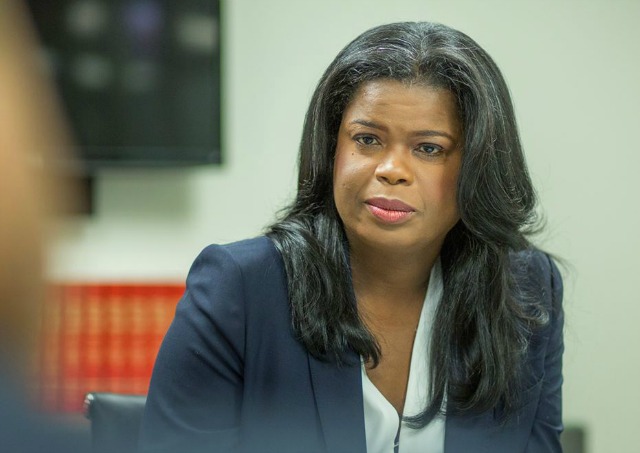A Look At The 'Dark Money' Behind Kim Foxx's States Attorney Campaign
By Sam Stecklow in News on Mar 10, 2016 9:00PM
In the highly contentious Cook County State's Attorney race, each candidate has their funding bases. Incumbent Anita Alvarez has Chicago's "old-boy power support" behind her, according to the Better Government Association—City Council's most powerful alderman, Ed Burke; Illinois's last true political boss, Michael Madigan; various associates of former Mayor Richard M. Daley. (She's also accepted over $25,000 from at least 60 of her employees.) Donna More is largely self-funding her campaign, as well as tapping into the Republican donor network. And Kim Foxx is working her political patron Toni Preckwinkle's connections; many of the largest donations to her campaign fund are from unions.
But Kim Foxx has also found two other sources of cash, in the form of twin $300,000 donations to a Super PAC supporting her called Illinois Safety & Justice. The sole donors to the PAC are neoliberal superdonor and conservative-boogeyman George Soros and a "dark-money" group called Civic Participation Action Fund. A Super PAC is a fundraising group, created by the 2010 Supreme Court Citizens United decision, that can raise as much money as they want for any candidate or cause—as long as they don't coordinate on any level with political campaigns, which have much smaller campaign limits.
Soros is a notorious liberal donor—he dropped $20 million on the 2004 election, and recently donated $8 million to a leading pro-Hillary Super PAC, as well as put up $5 million to increase Latino voter turnout. But according to Illinois Sunshine, a database of State Election Board filings maintained by the Illinois Campaign for Political Reform, this marks the first time Soros has entered into a political race in Illinois—ever. (Though he has been intervening in local District/State's Attorney's races with increasing regularity, donating over $400,000 in a Caddo Parish, Louisiana, nearly the same amount in Mississippi last year alone.)
Soros's presence in this race "really speaks to fact that Super PACs have become very influential in Illinois races, especially this cycle," according to Sarah Brune, the executive director of the Illinois Campaign for Political Reform. A request for comment to Soros's Open Society Foundations went unreturned by press time.
The sole other donor to Foxx's Super PAC is the Civic Participation Action Fund, which, like Soros, has never made a donation in an Illinois race before. CPAF is a 501(c)(4), a special kind of nonprofit organization that at once doesn't have to disclose its donors and can conduct political activity. They are frequently referred to by campaign finance reform advocates as "dark money," since it is usually unknown where the actual funding comes from. The 2010 Citizens United decision set off a spark of 501(c)(4) donations nationwide, and they are a key component of Governor Bruce Rauner's stated plot to take away the Democratic supermajorities in the Illinois General Assembly.
Dark money is "certainly something that's become much more pervasive," said Brune. "[Dark money groups] can be even more frustrating than the Super PAC because you're not able to access information on the donors.… It's not something that we enjoy seeing. It's just really troubling to voters when they can't see who is donating to their candidates. Not all donations are a bad thing, but if someone's going to contribute to a candidate for public office, they should understand that they're attempting to influence the outcome of a race for public office, so their contributions are gonna be made public."
Civic Participation Action Fund, according to its website, is a five-year project dedicated to advancing "racial equity, economic opportunity, and civic engagement" and will cease grant-making this year. On its website, it also states that it doesn't fund anything "overtly partisan" (maybe since everyone in the race is a Democrat, a State's Attorney's race doesn't count), anything that involves "institutional or core support for organizations," which is pleasantly meaningless (and also, what is the State's Attorney's office if not an organization?). In an op-ed published by the Chronicle of Philanthropy, the Fund's director, Steve McConnell, said that being organized as a "dark money" group allows the fund to "support a much wider range of advocacy and electoral activities that are issue-based, nonpartisan, and not coordinated with candidates or political parties than it could have as a foundation required to follow Section 501(c)(3)," a more traditional nonprofit structure. A request for comment to CPAF went unreturned.
University of Illinois at Chicago professor Dick Simpson says it's "unusual" to see out-of-state donors get involved in local races like this, though he noted that a little over half of the campaign contributions Mayor Rahm Emanuel raised between 2010 and 2015 were also from outside of Chicago.
Simpson says it's "obvious" that the donors' intentions are to oust Alvarez, who has been vilified by progressive media outlets in the for her handling of the high-profile Laquan McDonald police shooting case. He also noted that the Super PAC's current endowment of $600,000 is enough to have "serious effects on the race."
Outside of the Illinois State Board of Election's ruling that Foxx's use of a Preckwinkle-funded poll broke state rules and fined the campaign almost $20,000, the topic of funding has been largely overlooked during the campaign, though there are clearly lots of other issues to look at. In the most recent Tribune poll, Alvarez was beating Foxx by seven points.
